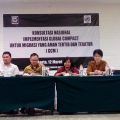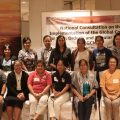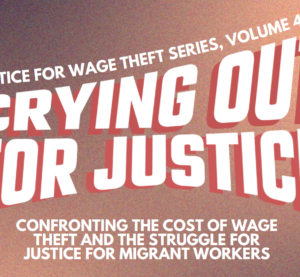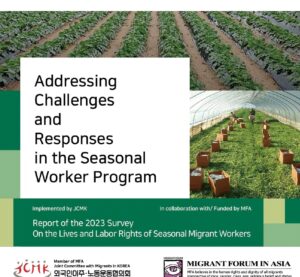Circular 20: Global Compact for Migration: 3rd Intergovernmental Negotiations Meeting
— April 14, 2018Dear Friends,
Hope all goes well. Greetings from Migrant Forum in Asia.
We are writing to share with you updates on the 3rd round of the Intergovernmental Negotiations Meeting on the Global Compact for Safe, Orderly, and Regular Migration. The 3rd Negotiations Meeting was held in the UN Headquarters in New York on 3 – 6 April 2018.
For this round, the co-facilitators encouraged Member States to not only deliver statements, but also react, comment, or debate on the statements and interventions that others have made upon discussing the GCM Draft Rev 1. The Special Representative of the Secretary General (SRSG) for International Migration, Louise Arbour, also provided updates and her personal observations on the process.
In those four days, the 3rd round of negotiations was only able to deliver general comments of Member States, as well as debate on the preamble, vision and guiding principles, and 16 objectives.
With this, the Co-Facilitators will produce no new draft of the GCM prior to the 14-18 May round of negotiations. They will generate new text on capacity building by next week or so. In the next round, States will continue reviewing the full text, beginning at Objective 17.
As there will be a month of interval between the 3rd and 4th round, it is important to utilize and maximize this idle time. Civil society can engage with the respective governments on issues that need to be unpacked, as well as recommendations on language, concepts, and perspectives.
General Atmosphere
During this round, a lot of the Member States have been going back and forth on the aforementioned contentious issues—being strong on how such distinctions should be made, but bearing in mind the principle of non-discrimination and how human rights are universal and inalienable; indivisible; interdependent and interrelated.
Similar to the previous rounds, there are only around 30 Member States out of the 193 that have come forward to take the floor. Silence is maintained perhaps because one Member State carries out a group when making interventions. However, this seems to also limit some of the Member States to share good practices and existing mechanisms they have.
The room is quite divided with Member States that are either progressive, passive, conservative, or regressive to extreme conservative positions. For Asia in particular, Member States such as Bangladesh, Nepal, Philippines, and Sri Lanka, have been constant in a forward-looking discourse. Japan, Republic of Korea, and Singapore have a relatively conservative position. However, a lot more work needs to be done for China, India, and Pakistan.
With the emergence of the like-minded group in the 2nd round, Nepal has joined and the group presented a statement at the end of the 3rd round. It mainly speaks on how they may have their own national priorities and circumstances, therefore, their experiences regarding migration are not necessarily the same. Nonetheless, they are united by their support to this process and by their ambition in reaching an agreement that can have a practical and meaningful impact on the lives of all migrants and their families. There was also a joint statement on labour mobility by Indonesia, Nepal, Philippines, and Sri Lanka as labour-sending countries in Asia. Both Statements are attached in this email for your reference.
In addition, 34 African States have expressed their concern on how their recommendations, some since the first round of negotiations, have not been reflected in the revised text noting how some of these recommendations did not have outstanding objections in the room. Comoros, on behalf of the 34 African States, has proposed several interventions and recommendations which very much reflects the commitments in the New York Declaration on Large Movements of Refugees and Migrants.
Contentious Issues
As Member States go through the Global Compact, there were still debates on contentious issues such as:
- Irregular and regular migrants—this is the biggest issue being debated even in previous rounds, which includes the issue on providing more regularization and regular pathways for irregular migrants
- Refugees and migrants—the two Compacts should be complementary but there are Member States that call for the removal of any reference to refugees in the GCM as it is a separate Compact
- National sovereignty and international law—there is a struggle of Member States whether respect to national sovereignty should prevail international law, and vice versa
- Inherent vulnerability – there is the question of vulnerability, whether it is inherent or external or circumstantial.
Updates and Personal Observations of Louise Arbour (SRSG for International Migration)
In light of the short gap between the 2 round of the negotiations, the SRSG shared in the plenary the request for Member States to contribute resources for the participation for the remainder of the negotiations, as well as the intergovernmental conference in December 2018 in Morocco. She also shared the request of the Deputy Secretary General to look at the Global Migration Group (GMG) on their:
- Respective mandates on migration-related issues and activities in this sector
- Human and financial resources that are currently deployed on these issues
- Outline modes of collaboration including existing MOUs in place with other UN agencies bilaterally, or otherwise, on migration related issues
- Views on how to improve existing coordination mechanisms at the national, regional, and global level, and suggestions on how to further integrate the competencies of IOM into the broader UN system
The responses are still being reviewed and followed up. The SRSG is also reviewing consultations and interventions to date on how migration governance seem to reflect perspectives on this issue in the development of recommendations and way forward, which will then be put forward to the Secretary General. She also welcomes suggestions and ideas on this issue and it would be useful to hear, in detail, on views, on ways, and means, to which IOM could exercise that leadership and coordination function that many of the Member States have advocate.
She also shared some observations and factors that all need to bear in mind:
- Inputs she received reveal a wealth of activity and inter-agency cooperation and collaboration at the country level. This needs to be enhanced, not eroded or impeded.
- No new mandate or structures are either necessary or desirable; it will actually be necessary how to best configure the system ensuring a central role for IOM. Any resulting model will need to take into consideration all the global, regional, and national levels of the migration agenda; be mindful of the need to draw fully on the skills, resources, and mandates on the entirety of the system and focus on deliverables rather than on cosmetic, institutional adjustments.
- Be mindful of resource implications not just as how existing activities are realigned, but also as they position the system to best support the Global Compact. There is a need to ensure that any resource allocation should reflect mandates and efficiencies while also directed towards achieving the 2030 Agenda for Sustainable Development.
- It would not be possible to put significant changes to how UN engages on migration overnight. These new directions, once determined, will need to be aligned with the Secretary General’s broader reform agenda and the final contours of the Compact. It will likely also entail some strengthening of IOM capacity in a number of areas.
What is clear is how all are fully engaged in the process of supporting the GCM, mindful of the desirability of integrating IOM more fully and centrally in the UN system, and attentive to the range of migration-related activities currently undertaken both by IOM and by many other UN actors.
Interactive Dialogue of the ILO and Constituents with Civil Society and other Stakeholders
The dialogue is organized by the Council of Global Unions Working Group on Migration (CGU-WGM) and the International Labour Organization (ILO), which took place on 4 April 2018 during the 3rd round of negotiations. Perspectives of the trade unions, civil society organizations, government, private sector, as well as IOM, ILO, and other participants in the room were regarding issues discussed even before the negotiations phase, the developments and current state of the GCM, challenges and gaps, and possible implications in the future. Below is the link of the Dialogue for your reference:
http://webtv.un.org/watch/towards-a-global-compact-that-safeguards-the-rights-of-migrant-workers-and-their-families/5764049133001/?link_id=1&can_id=c32607c2aa0253c8c677a44e4e3a400d&source=email-media-mentions-april-6-2018&email_referrer=email_329962&email_subject=media-mentions-april-6-2018
Sincerely,
MFA Secretariat





